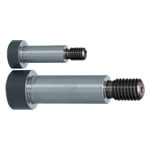(!)NOTE : Windows 7 users won’t be able to use some latest features of eCatalog/WOS since Microsoft is ending support for Windows 7 on 14 Jan, 2020. Please upgrade your system for uninterrupted services.
- Notice of End of Sales for Economy Series Pneumatic Equipment Category. More information.
MISUMI Bolt(Brand:C-VALUE)
MISUMI offers products Bolt specified by Brand C-VALUE from Plastic Mold Components product category. There are a total of 1 items. Plastic Molding Parts and accessories. MISUMI products are available to order through MISUMI online 24 hours a day. Free shipping, no minimum order.
Brand |
|
|---|---|
| CAD |
|
| Days to Ship |
|
1 items
- Sort By
-
You can add up to 6 items per a category to the compare list.

(Economy series) SHOULDER BOLTS
MISUMI
M (Nominal Diameter) Thread pitch L (L dimension)(mm) Brand Thread range 5 ~ 12 - 12 ~ 100 C-VALUE - From: ₹ 256.00 Days to Ship: Same day or more  Same day or more
Same day or more
| Brand |
|---|
| Product Series |
| CAD |
| From |
| Days to Ship |
| M (Nominal Diameter) |
| Thread pitch |
| L (L dimension)(mm) |
| Brand |
| Thread range |
You can add up to 6 items per a category to the compare list. | |
| Brand | MISUMI |
| Product Series | |
| CAD |
|
| From | ₹ 256.00- |
| Days to Ship | Same day or more |
| M (Nominal Diameter) | 5 ~ 12 |
| Thread pitch | - |
| L (L dimension)(mm) | 12 ~ 100 |
| Brand | C-VALUE |
| Thread range | - |
Loading...
Configure
Specification/Dimensions
-
M (Nominal Diameter)
-
Thread pitch
- Coarse
- Fine
-
L (L dimension)(mm)
-
Brand
- C-VALUE
-
Thread range
- With incomplete threaded part
- Full thread
Narrow search by specifying Manufacturer
Related Categories to Bolt
FAQ Bolt
- Question: What are the different types of bolts?
- Answer: There are many types of bolts, each with its own specific purpose. Some common types include: • Machine bolts: Used in general machine applications. • Carriage bolts: Have a square or hexagonal head with a rounded underside. • Cap screws: Similar to machine bolts but have a finished head. • Eye bolts: Have a loop or eye at one end. • U-bolts: Have a U-shape and are often used to secure pipes or other cylindrical objects. • Lag bolts: Have a square head and are typically used to fasten wood to other materials. • Anchor bolts: Used to secure objects to concrete or masonry.
- Question: What is the difference between a bolt and a screw?
- Answer: The main difference between a bolt and a screw is how they are installed. Bolts are typically installed with a nut, while screws are self-threading and can be inserted directly into a pre-tapped hole.
- Question: How do you install a bolt?
- Answer: To install a bolt, you typically need to: • Prepare the surfaces: Ensure the surfaces to be joined are clean and free of any obstructions. • Insert the bolt: Insert the threaded end of the bolt into a pre-tapped hole or through a hole in one of the objects to be joined. • Add the nut: Place a nut on the threaded end of the bolt. • Tighten the nut: Use a wrench or socket wrench to tighten the nut until the bolt is securely fastened.
- Question: How often should bolts be inspected?
- Answer: The frequency of bolt inspections will depend on the application and the environment. However, it is generally recommended to inspect bolts regularly, especially in high-vibration or corrosive environments.
- Question: How can bolts be prevented from loosening?
- Answer: There are several ways to prevent bolts from loosening, including: • Using thread lockers • Tightening bolts to the correct torque • Using safety wire or locknuts • Inspecting bolts regularly
- Question: How do I choose the right bolt size?
- Answer: Bolt size depends on the application. You need to consider: • Diameter: The thickness of the bolt. • Length: The length from under the head to the tip of the bolt. • Thread pitch: The distance between threads, critical for matching the nut. It’s important to choose a bolt that fits snugly and is long enough to pass through the material and secure properly.
- Question: What is the difference between coarse and fine threads?
- Answer: • Coarse threads: Fewer threads per inch, making them quicker to install and more resistant to damage or wear. Ideal for softer materials. • Fine threads: More threads per inch, providing a tighter and stronger hold. Used in high-tension applications.
- Question: What is a washer, and why is it used with bolts?
- Answer: A washer is a flat disc that distributes the load of the bolt, preventing damage to the material and helping to ensure a secure fit. Washers can also prevent loosening over time.





How can we improve?
How can we improve?
Thank you for your time.
Your feedback is essential for our continuous improvement
Privacy Policy
Thank you for your cooperation.
Thank you for your time.
Your feedback is essential for our continuous improvement
Please use the inquiry form.
Privacy Policy